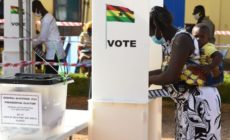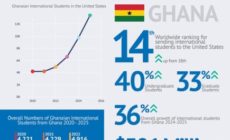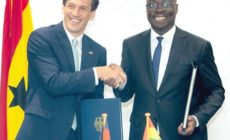Ghana can access $500m emergency fund – IMF
- Posted on
- Comment

Ghana can access up to $500 million in the form of concessionary emergency funding from the International Monetary Fund (IMF) to mitigate the effect of the coronavirus disease (CONVID-19) on the economy, the IMF Resident Representative in Ghana, Dr Albert Touna-Mama, has said.
The funding is available at zero interest and a moratorium and repayment will start after five-and-a-half years.
“We don’t yet have a final figure on the request for Ghana; we are working with the authorities to evaluate this. However, in general, the guide announced by the IMF for emergency funding is 50 per cent of quota. For Ghana, this is SDR 369 million or about $500 million,” he told the Daily Graphic last Wednesday.
“The good thing is that the government has been proactive in laying out options to deal with the economic fallout. We are working hard to support with policy advice and emergency financing,” Dr Touna-Mama said.
Rapid Credit Facility
On March 4, 2020, the IMF announced that it was ready to support vulnerable countries with different lending facilities, including the Rapid Credit Facility (RCF) for low-income countries which could amount to $10 billion and available at zero interest and a moratorium of five-and-a- half years.
Ghana is among 60-member countries that have already approached the fund to tap into the concessional emergency financing to help the country address the economic impact of the COVID-19 pandemic.
The RCF was created under the Poverty Reduction and Growth Trust (PRGT) as part of a broader reform to make the fund’s financial support more flexible and better tailored to the diverse needs of lower income countries, including times of crisis.
The RCF places emphasis on a country’s poverty reduction and growth objectives.
Recalibration of fiscal targets
Dr Touna-Mama explained that there was work underway to estimate the full impact of the pandemic on the public.
On whether it was too early for the government to begin to recalibrate the fiscal targets to accommodate the effects of the pandemic on the successful execution of the budget projections, he said an emergency budget might be needed or the mid-year budget review could be used to recalibrate the targets.
“It is up to the Minister of Finance or the government to decide. Certainly, there are provisions in the Fiscal Responsibility Law for this type of situation,” he said.
Relief packages
Dr Touna-Mama said there should be targeted and temporary cash flow relief to the people and firms that were most affected until the emergency abated.
He added that the government should subsidise wages for people and firms to help curb contagion and offer tax reliefs for people and businesses that could not afford to pay in the most vulnerable sectors, including transportation, tourism and hotels.
“We advise governments to try to alleviate the economic fallout of the coronavirus disease with timely, targeted and temporary policies.
First, there are savings that will emerge because of the necessary social distancing measures introduced to tackle the spread of the COVID-19. For example, money for travel, conferences and workshops can no longer be used, while utility bills for MDAs may be lower.
“Second, prioritising spending will also generate some fiscal space.
Choice will have to be made because there is a lot of pressure on public finance.
“Finally, tapping into other sources of financing is an additional option. The fact that the Eurobond issuance took place in early February also helps Ghana,” he added.
-Graphic










 (Selorm) |
(Selorm) |  (Nana Kwesi)
(Nana Kwesi)